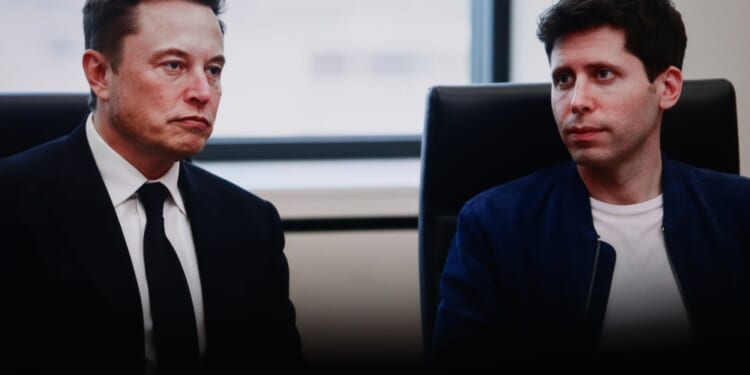We are living in the worlds imagined by Elon Musk and Sam Altman—realities shaped by Foundation, Her, and We Are Legion, where science fiction becomes strategy.
Artificial Intelligence (AI) is not just a technological contest; it’s a battle of imagination. As the United States and China race to shape the future of AI, many of the technologists and policymakers driving the agenda grew up in a world of science fiction. However, science fiction’s influence on our society goes beyond Grok’s sci-fi-inspired name and is not limited to AI innovators. From the dystopian Blade Runner to the optimistic Star Trek, science fiction has long served as both a mirror and a compass for human ambition. Today, as we rush ever closer to these sci-fi worlds, we find ourselves asking a key question: which way are we headed? Although many of the key pioneers of AI have been influenced by “utopian” sci-fi works, it seems that we are inching ever closer towards a corporate dystopia imagined by many novelists over the years.
The Rise of Elon Musk and Sam Altman as Techno-Protagonists
Two figures epitomize this dynamic more than any others. Elon Musk and Sam Altman have both drawn heavily from science fiction, not just for inspiration, but for internal moral justification. They both see themselves as protagonists in civilization’s next chapter, yet their narratives are not aligned with public accountability. As a result, we find ourselves drifting towards private governance of preeminent tech. Once imagined as a cautionary tale in science fiction, today, we find a techno-hegemony unfolding as a reality.
The Foundation Logic Behind Musk’s Empire
Elon Musk’s ventures are all bound by a single narrative of human survival through expansion. Isaac Asimov’s Foundation has often been cited as an intellectual underpinning of his worldview on AI, both by Musk himself and by Walter Isaacson, his biographer. In Foundation, a collapsing galactic empire faces extinction, prompting visionary scientists to try to preserve civilization. Musk’s ambition to colonize Mars mirrors this logic. If Earth collapses, humanity must endure elsewhere. He sees himself as a real-life Hari Seldon, armed with technology instead of psychohistory, anchored by a markedly utilitarian worldview ethic that prioritizes the continuity of humanity over the consent of the individual. For Musk, the big picture survival of human beings is an existential concern, and he has built an array of companies, all in the name of avoiding an Earth-bound catastrophe.
Musk’s Asimovian optimism is riddled with contradictions. For instance, Musk and Isaacson have both specifically cited Robert Heinlein’s The Moon Is a Harsh Mistress as having shaped him. The book champions libertarian values and warns against government overreach. Yet, he chooses his lessons selectively. Instead of public overreach, Musk’s power brings about concerns of private enterprises replacing public governance. From Tesla’s autonomous robots, to Starlink’s global infrastructure, to X’s agora, he consolidates extreme amounts of power in private hands.
The fusion of ideology and infrastructure blurs the boundary between an entrepreneur and a state. Like the “megacorps” of science fiction, Musk’s companies now serve geopolitical functions with little to no oversight. Specifically, his rhetoric on Mars, tracing back at least 20 years, shows that technological sovereignty is increasingly residing in private hands.
Altman Influenced by Intimate Machines
Where Musk channels the grand ambitions of Asimov’s works, Sam Altman’s primary influence embodies the intimate. Altman has famously named Spike Jonze’s Her as having influenced him. The film’s AI companion, voiced by Scarlett Johansson, shows a benevolent intimate relationship between human and machine, a motif frequently cited by Altman as having shaped his vision for OpenAI. In this view, artificial intelligence is not just a tool, but a partner capable of empathy and personal connection.
However, Altman’s optimism has the same paradox as Musk’s expansionism. His advocacy for rapid AI scaling, despite known risks, evokes the same theme of countless sci-fi narratives where creators lose command of their inventions. The 2024 controversy over OpenAI’s “Sky” voice perfectly shows the tension. The voice of the OpenAI agent had a striking resemblance to Johansson’s performance in Her. Altman’s decision to deploy this feature with that voice, despite explicit rejection from Scarlett Johansson, highlights an alarming pattern of ambition overriding ethics. Although public outcry eventually forced OpenAI to pause the rollout of the feature, this should be seen as a case study in corporate overreach and the influence of science fiction on reality.
Altman’s intellectual influences extend beyond film. He has referenced Dennis E. Taylor’s We Are Legion, a novel about digital consciousness fragmentation, to articulate his fascination with AI autonomy. A theme of the novel, however, that consciousness, even when digitized, should be aligned ethically before being given the potential to be replicated, seems to be lost on Altman. OpenAI, in its extreme competition for the best systems, has treated AI alignment as a problem to be solved later, rather than a fundamental design principle to be embedded from the start. This commercialized approach was a catalyst for internal friction in OpenAI that led to several key researchers leaving the company in 2021 and starting Anthropic, a different AI company that focuses primarily on safety. Later on in 2024, OpenAI’s superalignment team, composed for the specific function of AI safety, was dissolved after both team leaders left, citing safety not being a priority for Altman.
The Shoggoth Problem
The lack of understanding of the “black box” nature of AI is often referred to in the AI community as a “shoggoth.”Borrowed from H.P. Lovecraft’s horror mythology, the term has entered mainstream AI discourse to illustrate the gap between perceived alignment and actual control of AI systems. Despite this, advancement continues at a faster pace than ever, with AI safety as an afterthought—to be done as a reactive measure, rather than a proactive one.
The effect of science fiction on the world’s tech leadership is not incidental; it was a formative influence on the lives of many AI innovators. Musk, Altman, and others are not only building technologies, they are recreating the narratives they read as a child. Their references to Asimov, Heinlein, Jonze, and Iain Banks serve as a prophecy. Yet, where the authors warned of restraint, the technologists pursue a modern manifest destiny.
There are geopolitical consequences, too. As private actors continue to accumulate strategic assets, states risk ceding control over technologies that shape national and global security. In this sense, regulating AI is no longer a domestic issue, but a question of international stability. The United States and its allies face a choice on whether or not to allow science fiction’s corporate dystopia to solidify. The path forward requires deliberate decision-making. Policymakers must impose antitrust mechanisms to prevent technological monopolies and enforce transparency standards for AI training and deployment.
About the Author: Savar Suri
Savar Suri is an Émile Boutmy Scholar at Sciences Po Paris. He has previously worked with the Anwar Gargash Diplomatic Academy in Abu Dhabi.
Image: Photo Agency/shutterstock


















